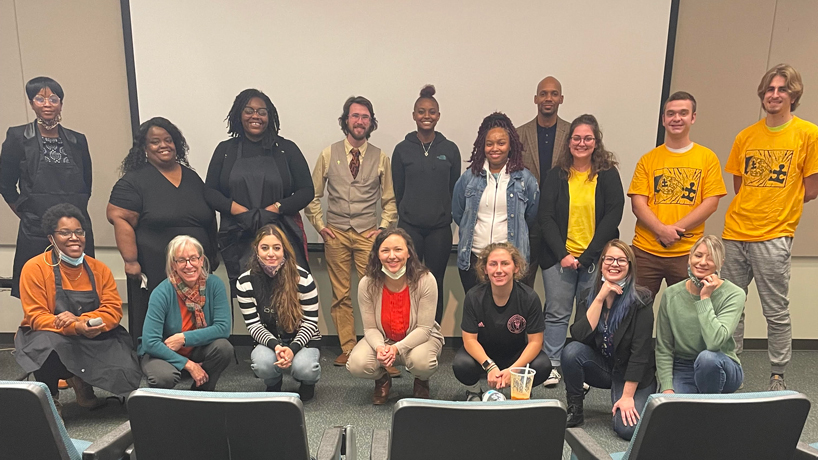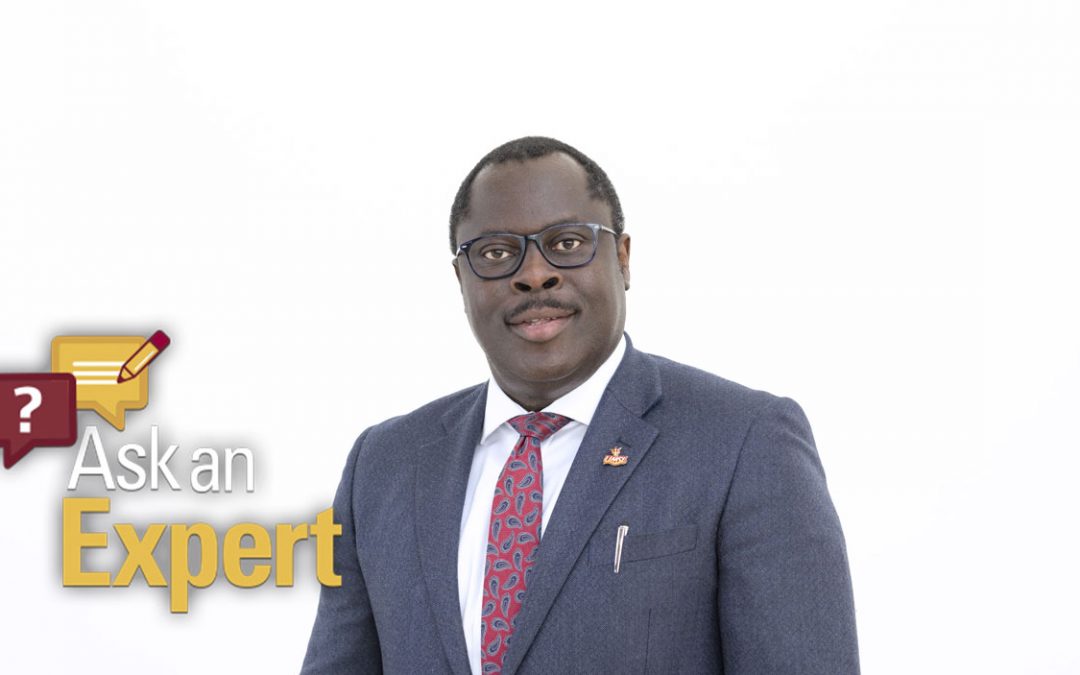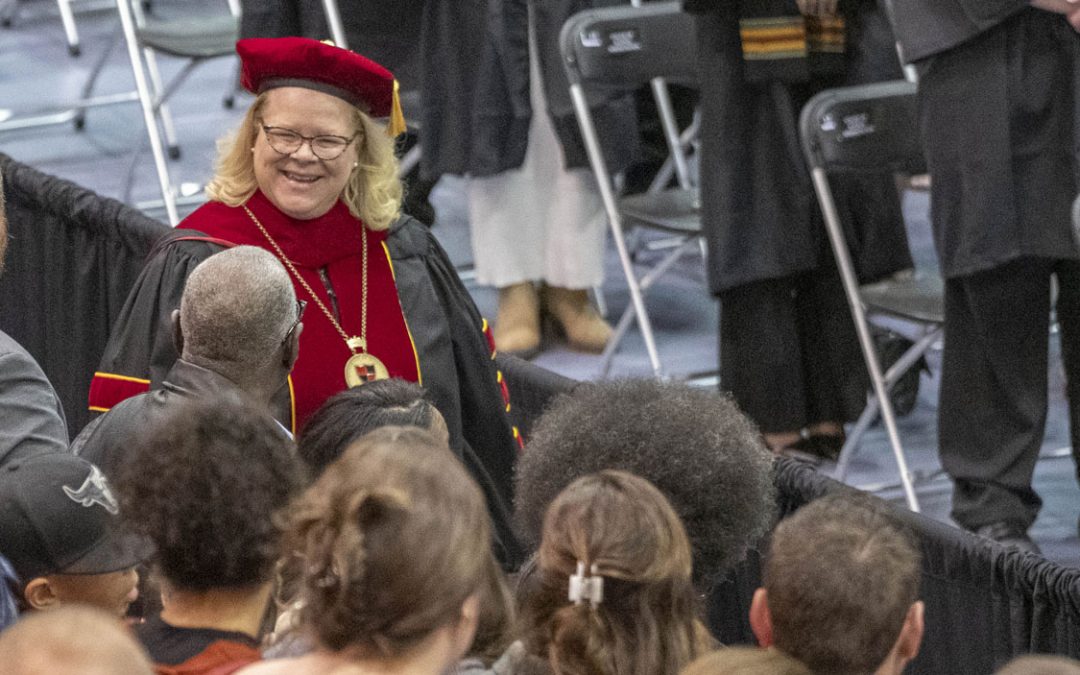
Last semester’s “Social Entrepreneurship” class was led by Theresa Coble (front row, second from left) and saw increased collaboration with UMSL Accelerate. The class is is designed to teach the skills necessary to solve problems in society and identify sustainable models for social innovation. Over the course of a semester, students work in groups to develop innovative social ventures. (Photo courtesy of Dan Lauer)
In December, Adam Morgan and his colleagues eagerly took the stage at the new UMSL Accelerate space on the University of Missouri–St. Louis campus and presented their idea for “My Voice, My Choice,” an awareness campaign to bridge the communication gap between nonspeaking patients and health care professionals.
“Our project was how to humanize health care for people who communicate differently,” said Morgan, a nonspeaking autistic person who communicates with an augmentative and alternative communication device. “I’d like patients who use alternative communication devices and methods to be respected, accepted and understood when engaging in health care decisions about themselves.”
Morgan and his classmates were pitching the idea as the culmination of a semester’s worth of work in their “Social Entrepreneurship” class led by Theresa Coble, the E. Desmond Lee Endowed Professor of Experiential and Family Education.
Coble said the class, which is part of the social entrepreneurship track in the College of Education’s BES program, typically attracts around 20 students per semester and is designed to teach the skills necessary to solve problems in society and identify sustainable models for social innovation.
But there was a new twist last semester.
Through increased collaboration with UMSL Accelerate, the partnership reached several new milestones. The social entrepreneurship students were first to tour the new UMSL Accelerate space, which was formerly Gallery 210, and provide feedback on its amenities. They also became the first students to utilize the space, particularly for class sessions, breakout groups and community engagement.
In recent years, the class has been structured around student pitches, but in Fall 2021 there was a new development. Students participated in community-engaged learning rotations at a diverse set of local organizations.
Dan Lauer, the founding executive director of UMSL Accelerate and the Anchor Accelerator, said the joint effort between the College of Education and UMSL Accelerate demonstrates the university’s desire to pursue interdisciplinary collaboration and innovation.
To him, it was an ideal way to kick off things in the new space.
“What was powerful was our first class was a social entrepreneurship class from the College of Education,” Lauer said. “I think that’s important to signal our commitment that innovation and entrepreneurship comes from everywhere.”
College of Business Administration Dean Joan Phillips concurred and applauded the effort.
“The College of Business Administration is proud of UMSL Accelerate and its commitment to interdisciplinary entrepreneurship education,” Phillips said. “Dr. Coble’s ‘Social Entrepreneurship’ class is an exciting example of this. This class brings together students of all majors to develop business plans to address social, cultural and environmental issues. Students learn that solutions to complex issues require a broad range of knowledge and expertise. But by collaborating across disciplines, it is possible to develop more robust solutions and strengthen the impact the entrepreneurial venture will have on society.”
College of Education Dean Ann Taylor also praised the interdisciplinary endeavor.
“The College of Education is deeply committed to collaborative work, whether that is partnering with communities or with colleagues across campus,” Taylor said. “We know that people have interests, curiosities and commitments that flow across disciplinary boundaries. We are delighted to see the blossoming of our social entrepreneurship strand in the BES as it intersects with the UMSL Accelerate programming.”
Coble said she jumped at the chance to work with Lauer in the new UMSL Accelerate space. This was a logical next step that built on their Interdisciplinary Entrepreneurship Committee work. It was a natural fit considering her work with the BES program and her expertise in interpretation, which helps people find meaning at heritage sites outside of the classroom.
It seemed like just the right circumstances to bring these added dimensions to BES students. Coble added that BES students, many of whom are nontraditional, bring their own unique experiences to the table.
“They are bootstrapping,” Coble said. “They are figuring out how to navigate and make things better for their families. They’re highly motivated, and I would say these skill sets – I became convinced – could be something that helps build confidence and also unlocks strategies for them to pursue their careers. It just seemed like a perfect fit.”
Morgan was one such student.
As a nonspeaking autistic person, Morgan has continually worked to break down barriers in his life. He has created a YouTube channel called “Tech Talk with Adam Morgan,” contributed to the book “Leaders Around Me: Autobiographies of Autistics who Type, Point, and Spell to Communicate” and done consulting work through the Adam Morgan Foundation, a nonprofit run by his mother to support inclusive opportunities for neurodiverse individuals in all aspects of their lives.
The class interested Morgan because entrepreneurs developed the innovative technology that allowed him to find his voice and go to college. He also realized he had a penchant for marketing in high school.
“I took marketing in high school and loved it,” Morgan said. “We got to invent new products, and it was so much fun and tapped into my creativity. In my world, people with disabilities have to fit into a world that is not accommodating. I’d like to create products and educational tools to give everyone the same opportunities with proper accessibility.”
Although not every student came into the class with Morgan’s entrepreneurial streak.
Coble said that many students had to get comfortable with the notion of testing and selling their ideas. Over the course of the semester, they learned to analyze community needs, conduct audience research and customer discovery, consult experts, identify community partners and use design-thinking tools.
Lauer and Coble explained that those lessons will be useful whether students decide to start their own social venture or work within an existing organization such as a nonprofit or school district.
“We’re excited about the curriculum, and we’re excited about the students,” Coble said. “We’ve had a great go of it this fall. It’s a different flavor of entrepreneurship than what would happen in a business class. My hope for these students is they take my class, and they learn some initial skills. Then they say, ‘I’d like more of the business tools to add to my skill set.’”
The students’ projects spanned a variety of issues and causes that personally resonated with them. One group aimed to make healthy food appealing in schools via smoothies made with fresh produce, while another looked at ways to combat food deserts in underserved communities.
Morgan and his group’s My Voice, My Choice campaign was inspired by his experiences in the health care system.
“I’ve had trauma with health care visits, and many doctors ignore me and ask my mom,” he said. “It is very dehumanizing when you are ignored and everyone in the room is talking about you like you aren’t there. I don’t have a cognitive disability. I have a motor disability and communicate differently, not less than.”
Their project was modeled after other successful awareness campaigns such as Got Milk? and the ALS Ice Bucket Challenge. Ultimately, the goal is to create health care environments where patients with communication differences can freely share their concerns and health care professionals interact with patients via their desired communication path.
Lauer was impressed with how the group worked through the entrepreneurial process and refined their initial concept. Morgan said a virtual townhall with more than 20 participants, including doctors and nonspeaking patients, helped them strengthen the campaign.
The group decided to drive awareness and spark involvement though advertising, social media and merchandise. Partnerships with StationMD and the Adam Morgan Foundation to create resources such as training videos and helpful communication seminars for professionals was another key component.
The group envisioned those efforts leading up to April 2, National Autism Awareness Day, where people would be asked to give up their voice for a day and use alternative communication methods in solidarity with the nonspeaking community. It would be branded with the tagline, “One day is nothing compared to a lifetime,” and ideally, participants would post on social media using #MyVoiceMyChoice.
Morgan was pleased with the final result, and overall, he enjoyed the class.
“I loved the hands-on experience and project work,” he said.
Going forward, Lauer hopes to “put more wood on the fire” and expand the number of classes collaborating with UMSL Accelerate. He and Coble also hope to build on last semester’s success by adding more social entrepreneurship classes.
“In social entrepreneurship, there’s a lot more to learn and grow if you truly want to be in that vein,” Lauer said. “Social entrepreneurship isn’t going anywhere. It’s a growing space, and we could lead in that space.”














